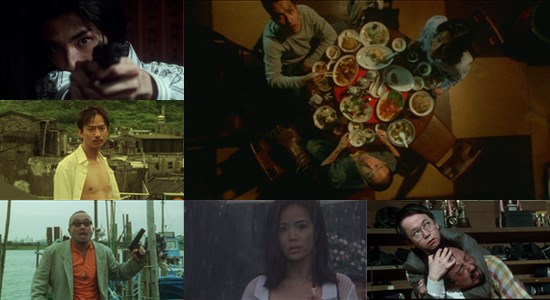
Written by Hayley Scanlon on 20 Jan 2017
Distributor Arrow Video • Certificate 18 • Price DVD: £24.99; Blu-ray: £29.99
Takashi Miike is one of the most prolific Japanese directors currently working. Though this often lends his output a hit and miss quality, it does provide him with the opportunity to experiment with different styles and genres even if not all of those experiments are entirely successful. This devil may care attitude may have developed during his time working in the no holds barred V-cinema genre which offered a similar level of auterist potential thanks its fast turnaround, low budgets, and lack of overall supervision.
The Black Society Trilogy begins with the first film Miike made outside of V-cinema, Shinjuku Triad Society, but the “trilogy” itself is a loosely applied retrospective term for these three films made some space apart but dealing with broadly similar themes born of the back streets of the Japanese underworld. Unconventional families, mixed nationalities, racial prejudice, exploitation and the brutality of the system all have their part to play but it’s impossible to escape the fact that the universally tragic fates which befall each of our heroes are man made creations, essential parts of a collaborative system which does not allow for difference in its smooth universality.
Miike’s first mainstream cinema feature, Shinjuku Triad Society has much in common with his down and dirty V-cinema work in its noir-tinged setting of the sleazy, crime ridden underworld of the Shinjuku area. Tatsuhito, the “hero” of the piece, if you can call him that, is a policeman with Chinese heritage who finds himself often rejected by both communities even though he’s quite clearly committed himself to Japan in becoming a law enforcement official. His younger brother, however, has chosen China in becoming a junior lawyer to a local gang of Taiwanese triads. Tatsuhito’s main aim is to “save” his brother who has also become the homosexual lover of the crazed gang leader Wang, but in doing so he ultimately sacrifices his own place in the very family he was so desperately trying to resurrect.
Family comes up again in the second film in the trilogy Rainy Dog as exiled gangster Yuji gets landed with a kid who might be his son in raindrenched Taipei. Teaming up with a net savvy prostitute who, like him, hates the rain and dreams of escape, Yuji builds a makeshift family with more potential for warmth than the fake bonds he’s built with the gang leader who claims to regard him as a son. Nevertheless, his attempt to make a break for sunnier climes sees him brought low by the fate which has stalking him ever since he arrived in the island capital.
The third film, Ley Lines, unites the themes of the previous two in its story of three country boys who face local prejudice because of their Chinese heritage and decide their future lies abroad. Taking a train to Shinjuku (neatly bringing us full circle) the guys wind up engaged in some dodgy business but eventually add a fourth companion in the form of a brutalised prostitute, also eager to leave Shinjuku far behind. Young toughs as they are, the guys think they can outwit the local gangsters armed with little more than chutzpah but again, the world is a harsh place and freedom may only be found outside of it.
These three films were not conceived as a trilogy and were filmed amid Miike’s numerous efforts of the period yet they do each share a number of common themes whether it be the place of the outsider as manifested in Japan’s complicated relationship with China, or in the way those who find themselves cast out from Japan’s intensely conformist society create families of their own in order to survive. The quest for familial connection is key to each film, from Tatsuhito’s attempt to rebuild his own fragmenting family unit, to Yuji’s ambivalance about the boy who may be his son, or the three boys’ banding together with their new friend to make a final last ditch effort for escape from the land which continues to reject them. Notably, all of these families fail in so much as they provide no refuge or escape from the problems which continue to plague the protagonists though do provide a degree of mutual support and comfort not found in other areas of their lives.
The Black Society is a dark place indeed. Built on exploitation and sustained by compliance, this hidden underbelly behind the alleyways of Shinjuku is only the manifestation of a set of wider damaging social attitudes from casual racism and xenophobia to rigid classist hierarchy and intolerance. Maintaining the grittier, V-cinema inspired aesthetic of Miike’s early work, the trilogy adheres closely to the melancholy action genre embracing many of the themes Miike would continue to address throughout his later career. This is a world which is almost devoid of hope but the almost is the very worst aspect of it as each of our protagonists still have the belief they can somehow escape only to find that the doors have been locked all along and if a key exists, it will never be theirs to turn.
Japanese/Mandarin with English subtitles.
On disc extras include: New interview with director Takashi Miike, New interview with actor Show Aikawa (Rainy Dog, Ley Lines), New audio commentaries for all three films by Miike biographer Tom Mes, Original theatrical trailers for all three films.
posted by Richard Durrance on 17 Dec 2025
posted by Richard Durrance on 12 Dec 2025
posted by Ross Locksley on 09 Dec 2025
posted by Richard Durrance on 28 Nov 2025
posted by Richard Durrance on 25 Nov 2025
posted by Richard Durrance on 18 Nov 2025
posted by Richard Durrance on 14 Nov 2025
posted by Richard Durrance on 11 Nov 2025